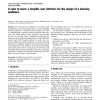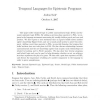288 search results - page 16 / 58 » Learning to Play Chess Using Temporal Differences |
112
Voted
PUC
2006
15 years 2 months ago
2006
In this paper we introduce the design and development of the Learning Cube as a novel tangible learning appliance. Using the common shape of a cube we implemented a general learnin...
114
Voted
AAAI
2007
15 years 5 months ago
2007
In normal scenarios, computer scientists often consider the number of states in a game to capture the difficulty of learning an equilibrium. However, players do not see games in ...
147
Voted
ICARCV
2002
IEEE
15 years 7 months ago
2002
IEEE
This paper presents an approach for view-based recognition of gestures. The approach is based on representing each gesture as a sequence of learned body poses. The gestures are re...
146
Voted
JOLLI
2008
15 years 2 months ago
2008
This paper adds temporal logic to public announcement logic (PAL) and dynamic epistemic logic (DEL). By adding a previous-time operator to PAL, we express in the language statemen...
144
Voted
CVPR
2010
IEEE
15 years 11 months ago
2010
IEEE
We present two novel methods to automatically learn spatio-temporal dependencies of moving agents in complex dynamic scenes. They allow to discover temporal rules, such as the rig...


